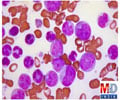Highlights
- Patients with chronic myeloid leukemia are commonly treated with a group of drugs called tyrosine kinase which includes drugs like imatinib mesylate and dasatinib.
- These drugs improve chronic myeloid leukemia survival rate but usually do not result in a complete cure.
- A novel approach using precision medicine to kill the chronic myeloid leukemia stem cells that give rise to the cancer cells has potential in curing cancer.
Other drugs used in the treatment of chronic myeloid leukemia include interferon alfa hydroxyurea , busulfan and omacetaxine. Leukapheresis, which is a process through which excess white blood cells are removed from the blood and bone marrow or stem cell transplantation may be used in some cases.
Persistent research has led to the discovery of a treatment that can specifically kill the stem cells in the bone marrow that generate the cancer cells, and thereby treat CML. This medication, an EZH2-specific inhibitor (EZH2i), inhibits a protein called EZH2 that is important for the survival of these stem cells. Since the protein is not found in normal body cells, an EZH2-specific inhibitor may not cause serious effects to other parts of the body. Researchers believe that this drug can kill more than 90% of stem cells and could possibly result in a cure for the deadly cancer.
The new treatment has a potential to be used with tyrosine kinase inhibitors to possibly bring about a complete cure of cancer. It will be used as a pill that is taken orally. The researchers hope to start clinical trials and move to the next step in the development of the drug, which could be a life saver to several blood cancer patients.
References:
- Scott MT et al. Epigenetic Reprogramming Sensitizes CML Stem Cells to Combined EZH2 and Tyrosine Kinase Inhibition. Cancer Discov 2016; 6(11); 1–10












